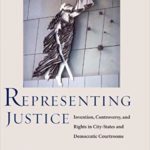Author
A Regulatory Design for Monetary Stability
Oct. 24, 2012—This Article proposes a unified regulatory approach to the issuance of “money-claims”—a generic term that refers to fixed-principal, very short-term IOUs, excluding trade credit. The instability of this market is arguably the central problem for financial regulatory policy. Yet our existing regulatory system lacks a coherent approach to this market. The Article proposes a public-private...
Justice for All?
Sep. 24, 2012—In REPRESENTING JUSTICE: INVENTION, CONTROVERSY, AND RIGHTS IN CITY-STATES AND DEMOCRATIC COURTROOMS (Yale University Press, 2011) by Judith Resnik and Dennis Curtis, art takes center stage as Resnik and Curtis focus on the visual renderings of the law, rather than on the words that make up the law, to analyze the pursuit and practice of justice...
American Legal History Revisited
Sep. 13, 2012—This book review by Professor James W. Ely, Jr., considers G. Edward White’s LAW IN AMERICAN HISTORY, VOLUME 1: FROM THE COLONIAL YEARS THROUGH THE CIVIL WAR (Oxford University Press, 2012) and discusses the contributions of this work to the wide array of existing American legal histories. PDF Download Link: American Legal History Revisited AUTHOR: James W....
Social Movements, Legal Change, and the Challenges of Writing Legal History
Aug. 1, 2012—Reviewed: COURAGE TO DISSENT: ATLANTA AND THE LONG HISTORY OF THE CIVIL RIGHTS MOVEMENT (Oxford University Press, 2011). This Essay by Professor Christopher W. Schmidt identifies the key contributions that Tomiko-Brown Nagin’s Courage to Dissent makes to the legal history of the civil rights movement. It situates the book among several other prominent legal histories...
Mass Torts and Due Process
May. 31, 2012—Almost all courts and scholars disfavor the use of class actions in mass tort litigation because class actions infringe on each plaintiff’s control, or autonomy, over the tort claim. The Supreme Court, in fact, has strongly suggested that protecting litigant autonomy is a requirement of due process and has done so in recent decisions concerning...
Delegating Supremacy?
May. 31, 2012—Under the Supreme Court’s preemption doctrine, federal agencies may preempt state law in much the same way that Congress can. While the Supremacy Clause clearly empowers Congress to preempt state law, administrative preemption rests on the undertheorized assumption that Congress may “delegate supremacy” to agencies. This Article challenges the constitutionality of that premise and offers...
Reinventing Sovereignty?: Federalism as a Constraint on the Voting Rights Act
May. 31, 2012—The framers of the U.S. Constitution wrote the Elections Clause to address concerns that the states would fail to call congressional elections and weaken the already fragile new government. The Clause is a delegation of sovereignty from the states to the federal government because, although states select the “time, place, and manner of elections,” Congress...
Costly Intellectual Property
Apr. 27, 2012—Though they derive from the same constitutional source of law, patents and copyrights vest very differently. Patents arise only after an applicant successfully navigates a cumbersome and expensive examination, while copyrights arise costlessly upon mere fixation of a work in a tangible medium of expression. Each of these vesting systems has drawn much criticism. Some...
Extralegal Punishment Factors: A Study of Forgiveness, Hardship, Good Deeds, Apology, Remorse, and Other Such Discretionary Factors in Assessing Criminal Punishment
Apr. 27, 2012—The criminal law’s formal criteria for assessing punishment are typically contained in criminal codes, the rules of which fix an offender’s liability and the grade of the offense. A look at how the punishment decisionmaking process actually works, however, suggests that courts and other decisionmakers frequently go beyond the formal legal factors and take account...
Loss Aversion and the Law
Apr. 27, 2012—Why is tort law much more developed than unjust enrichment law? Is there a reason for the very different legal treatment of governmental takings and governmental givings? Why are contract remedies structured around the four “interests” and why is the disgorgement interest only marginally protected? What might explain the much greater constitutional protection of civil...



